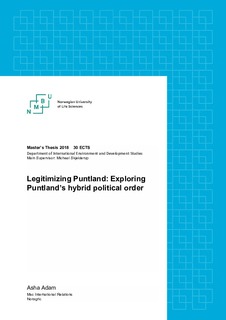Legitimizing Puntland : exploring Puntland’s hybrid political order
Master thesis
Submitted version
Permanent lenke
http://hdl.handle.net/11250/2574057Utgivelsesdato
2018Metadata
Vis full innførselSamlinger
Sammendrag
In the era of ‘new wars’ and state-failure, the state-building paradigm have shifted from the normative policy discourse towards a more pragmatic one with alternative approaches. In this, the Western ideal of statehood and governance is compromised in state-building in order to achieve localised solutions for post-conflict societies. It was this outlook that laid the foundation of Puntland. The clan communities of Puntland opted for London School of Economics ‘bottom-up’ and ‘building-block’ approach after a series of failed ‘top-down’ initiatives in Somalia’s reconciliation. The success of this approach was the integration of local actors and institutions in the state-building project to establish a state that is viewed legitimate by the local population. However, while some states embrace hybridity, Puntland with its mainstream perspective views it as a preliminary phase towards modern statehood in the state-building process. Despite this, for the past 20 years, Puntland has neither transitioned to democracy nor institutionalized its hybrid system. The aim of this thesis is to give an insight on Puntland’s political system by exploring the informal hybrid political order. The research sheds light on the backstage dynamics between the traditional and state authorities and presents how they coproduce authority and source legitimacy. Finally, the thesis presents the paradoxes of this political system and discusses how the transitional and the informal status of the hybrid order damages the legitimacy of Puntland’s state and traditional authorities.

